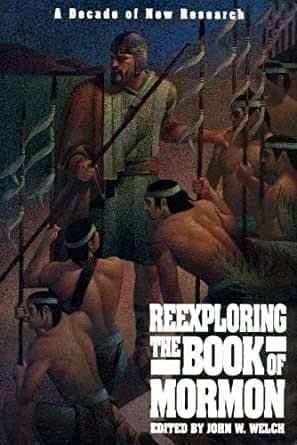Book
85 Chapters

Abstract
A striking new study has been initiated comparing a subtle, recurring pattern in the Book of Mormon with a particular type of human behavior recently identified in the writings of the “survivors” of Hitler’s and Stalin’s death camps. A link between these testimonies might at first seem unlikely, but upon reflection, however, it is clear that Mormon and Moroni, Lehi and Nephi, Alma and Amulek, Ether and Coriantumr, and others in the Book of Mormon were also witnesses of atrocious deaths and genocide. Did these ancient annihilations and modern holocausts generate similar human reactions from their final survivors?Mormon 3:16 “I did stand as an idle witness.”
A striking new study has been initiated comparing a subtle, recurring pattern in the Book of Mormon with a particular type of human behavior recently identified in the writings of the “survivors” of Hitler’s and Stalin’s death camps. A link between these testimonies might at first seem unlikely, but upon reflection, however, it is clear that Mormon and Moroni, Lehi and Nephi, Alma and Amulek (Alma 14:10-11), Ether (Ether 15:34) and Coriantumr (Omni 1:21), and others in the Book of Mormon were also witnesses of atrocious deaths and genocide. Did these ancient annihilations and modern holocausts generate similar human reactions from their final survivors?
Preliminary results indicate that they did, and that a specific pattern of witness and a unique literary genre emerge from these extreme conditions. The best account of this “literature of survival” is by Terrence Des Pres.1 He says that survival is a “specific kind of experience. It has a definite structure.”2
What is that structure? Of the many possible ways in which humans might react to the man-made horrors of genocide—bitterness, anger, indignation, or despair, for example—the dominant response of the few who survived the European concentration camps has been an irrepressible desire “to bear witness.” The world of death camps and gulags produces a consistent reaction, a will to survive not for oneself, but rather to bear witness to the world in a particular kind of testament or indictment against man’s inhumanity to his fellows. “Survival is an act involving choice [even when death might seem easier]; . . . bearing witness is a typical response to extremity.”3 The “utmost concern” of such survivors was to hide up a record “preserved for future generations.”4 One survivor speaks of his duty to witness as a “mission,” a “sacred task,” and a “burning within me, screaming: ‘Record!’ “5
Survivors often covenant together to make sure that at least one should make it through to warn the world: “In extremity men and women make a special promise among themselves, always implicit and often openly declared. Whoever comes through will take with him the burden of speaking for the others.”6
Des Pres’s research yields an elaborate profile of the survivor’s behavior. That profile has much in common with the human conduct of several people in the Book of Mormon, like Mormon and Moroni. For example, there is the will “to remember and record”7that overcomes one’s fears of the surrounding savagery (see Mormon 2:15; 4:11-21). There is the survivor viewing his task as a sacred duty, born out of the realization that no one will be left.
As the call came to Mormon fairly early to retell the Nephite saga, so the will to bear witness normally has arisen early in other survivors “during the initial stage of adjustment to extremity.”8 The task is frequently carried out in secret,9 often by depositing the record in a hidden archive (see Mormon 4:23; 8:3-5). The witness speaks simply as a sorrowful eyewitness to the whole world.10 He is a necessary connection between the past and the future, speaking as it were “out of the dust” on behalf of those who have died (see 2 Nephi 26:15-18; 27:6; Mormon 3:16-18; 5:8-10; 6:17-22; 7:1-10; 8:26).11 The survivors, according to Des Pres, perceive that “good and evil are only clear in retrospect.” Thus their mission is to display the “objective conditions of evil.”12
Obviously, there are several differences among the personalities, conditions, and divine callings of each survivor witness in the Book of Mormon, as well as between them and the survivors of modern holocausts. But there are also many distinctive and unexpected similarities. By understanding through human eyes the inspired responses of Book of Mormon prophets to the unimaginably extreme situations they faced, modern readers can appreciate another dimension of their effective, penetrating testimonies. Thus the message of the survivor is especially important to students of the Book of Mormon. The true-to-life, urgent testimony of the survivors in that record provides us several unexpectedly powerful examples of the “will to bear witness.”
Based on research by Gordon C. Thomasson, April 1984. Other insightful similarities and examples are cited in the study on this topic that appeared shortly after this Update: Lisa Bolin Hawkins and Gordon C. Thomasson, “I Only Am Escaped Alone to Tell Thee: Survivor Witnesses in the Book of Mormon” (Provo: F.A.R.M.S., 1984).
Footnotes
1. Terrence Des Pres, “Survivors and the Will to Bear Witness,” Social Research 40 (1973): 668-90; The Survivor: An Anatomy of Life in the Death Camps (New York: Pocket Books, 1977).
2. Des Pres, “Survivors and the Will to Bear Witness,” 669.
3. Ibid., 672-73.
4. Ibid., 670.
5. Ibid.
6. Ibid., 678; compare Mormon 8:3.
7. Ibid., 668-69.
8. Ibid., 679.
9. See ibid., 670.
10. See ibid., 671.
11. See ibid., 676.
12. Ibid., 687-89; compare Helaman 12:3, Mormon 8:36-41.
Book
85 Chapters
Items in the BMC Archive are made publicly available for non-commercial, private use. Inclusion within the BMC Archive does not imply endorsement. Items do not represent the official views of The Church of Jesus Christ of Latter-day Saints or of Book of Mormon Central.